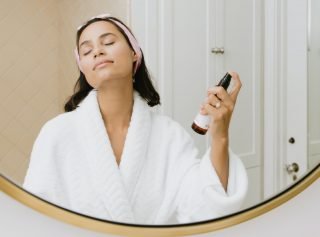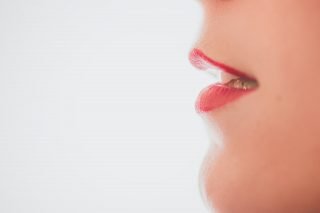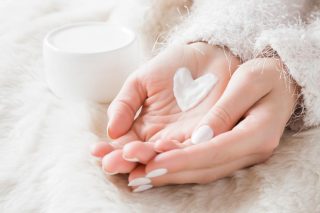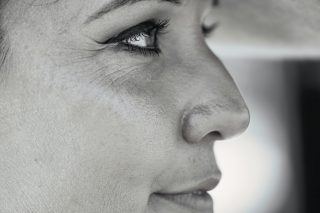Your skin tells a story about your age, your health, and how well you take care of yourself. Your face is an essential part of that story, but there are other areas that are just as, if not more, important.
Your eyes, lips, hands, neck, and chest are the most forgotten areas of your body. These are also areas where you’ll likely start noticing the first signs of aging. They are the first to also show damage from environmentally free radicals, such as pollution, smog, invisible light, computers, and monitor screens. So, you don’t want to pass them over. Here’s why:
Your skin is sensitive
The skin on and around these areas is thinner and, as a result, more delicate than that on the rest of your face and body. As the rule goes: the thinner the skin, the more vulnerable the area is to external factors like sun damage and oxidative environmental damage.

Photo by Kalos Skincare on Unsplash
In addition, the tops of your hands and your neck and chest are more exposed to sunlight and free radicals than you might realize, like when you’re driving or just having a walk outside.
They’re hard-working
The skin in and around these areas gets a lot of action. For starters, your hands are always busy: writing, cooking, driving, etc. Not to mention, they’re also exposed to the frequent handwashing required in the time we are living in.
Have you ever thought about how often you move your eyes, whether consciously or not to convey something, or how many times we blink per day? Such as when you raise your eyebrows when you’re surprised or to show interest, or rub your eyes when you’re tired, and pull on the surrounding skin to apply makeup. All these “innocent” habits can have sinister consequences like breaking capillaries and damaging collagen.
The skin has less or no oil glands
Your sebaceous or oil glands moisturize your skin and have many protective benefits. Research shows that wrinkles tend to be more pronounced where oil glands are less concentrated, but sadly, eyes, lips, hands, and neck and chest are all lacking in the oil glands department. This means wrinkles in these areas tend to be more severe, and it also explains why lips and hands get so easily dry, sore, and cracked.
1. Eyes
Common skin issues around the eyes include dark circles, fine lines, puffiness, and sagging. The best way to combat these issues is to use the correct eye cream, and a person’s skin concern will determine which ingredients to look out for.
The golden rule of eye cream application is ‘gently does it’. Pat or press the cream in with the pads of the fingers, from the inner to the outer corners of your eye area. Many patients ask me
“What about your eyelid?”. It really depends on the cream you’re using, so read the directions but don’t avoid this area. Your upper eyelid skin needs as much care as your lower eyelid skin. Lastly, let it sink in, and don’t overdo it.
When to apply eye cream
Applying eye cream should be the fourth step in your morning skincare routine. It should be applied after your toner and antioxidant serum, and before your spot treatment and moisturizer. It should be the third in your evening routine, after your toner and before your vitamin A serum and moisturizer.
2. Lips
The lips’ common issues are dryness, cracks, and itchiness. The best way to deal with these issues is to use a lip balm formulated with broad-spectrum sunscreen to protect your lips from external factors. Also, don’t forget to use a gentle scrub to get rid of dead skin cells by exfoliating your lips once a week.

Photo by Timothy Dykes on Unsplash
How and when to moisturize
A good rule of thumb is to apply lip balm when you wake up, after eating or drinking, and before you go to bed. Applying way more than that can have the opposite effect.
3. Neck and chest
It is best to think of your neck and chest as an extension of your face. The most common issues that this area faces are wrinkles, dark spots, and dryness.
How and when to apply products to your décolletage
Simply lift your chin and use upward motions with your index, middle, and ring fingers. Repeat morning and night. Whatever you do, don’t pull your skin, which can cause damage and exacerbate the appearance of wrinkles.
4. Hands

FotoDuets/Shutterstock.com
Hand care should never be an afterthought. The most common issues that hands are perceptible to are cracks, callouses, dryness, and sun damage.
How often and when to apply hand cream
When it comes to how often to apply hand cream, there’s no magic number. It really depends on how often you wash your hands. Luckily, most hand creams are formulated to absorb quickly, so you can continue to go about your business.
Bottom line
If you’re in the mood for something a little more heavy-duty, like a heavy emollient moisturizer, then I recommend applying it for bed. That way, you’re giving it a good eight hours to really penetrate your skin.




![women [longevity live]](https://longevitylive.com/wp-content/uploads/2020/01/photo-of-women-walking-down-the-street-1116984-100x100.jpg)










